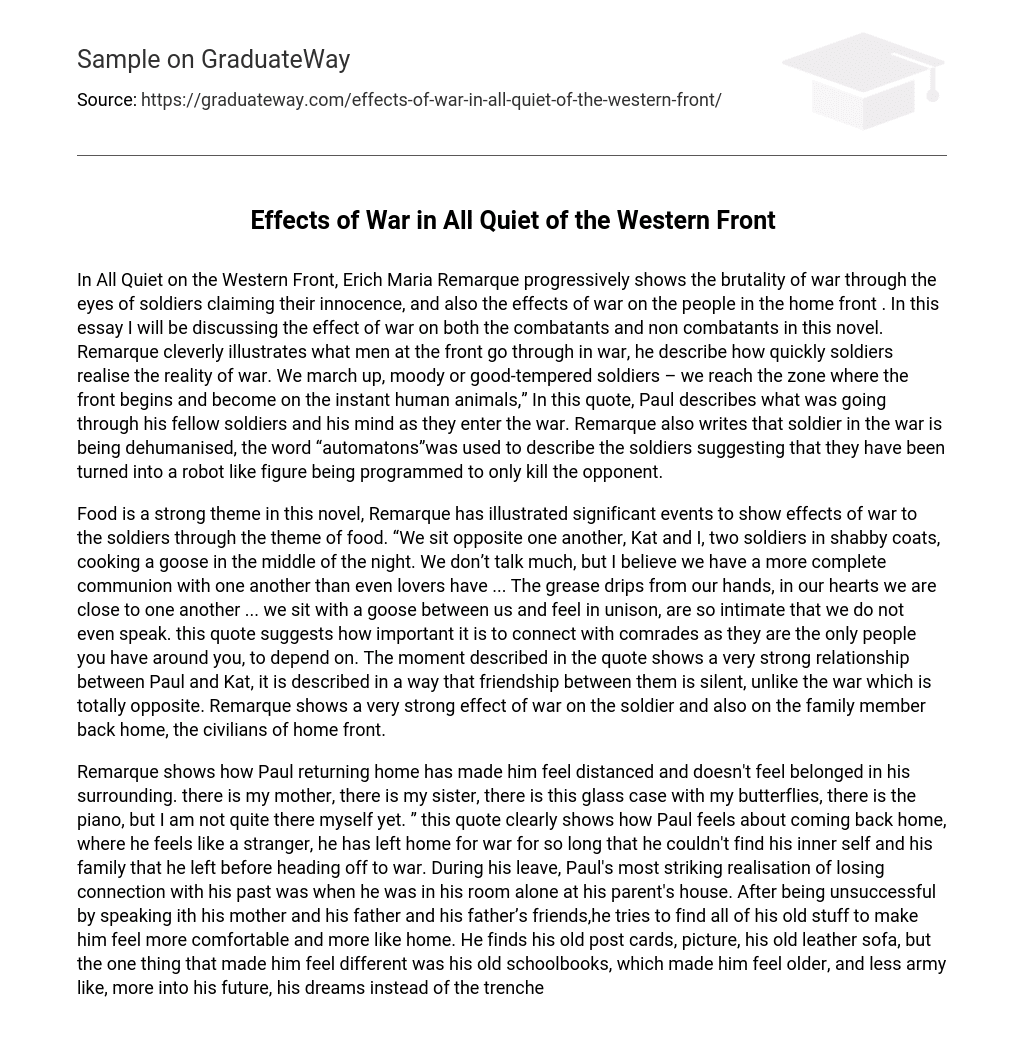Erich Maria Remarque portrays the brutality of war in All Quiet on the Western Front, revealing its impact on both soldiers and civilians. This essay will explore how war changes combatants and non-combatants in the novel. The author effectively depicts the harsh reality of war experienced by those at the front lines, as soldiers quickly grasp its true nature. As Paul puts it, “We march up, moody or good-tempered soldiers – we reach the zone where the front begins and become on the instant human animals.” This quote reflects the mindset of Paul and his comrades as they enter the war. Remarque further emphasizes that war dehumanizes soldiers, referring to them as “automatons” who resemble robots programmed solely to kill the enemy.
The novel emphasizes the theme of food to depict the impact of war on soldiers. Remarque illustrates significant events centered around food to convey the effects of war. In one scene, two soldiers, Kat and I, cook a goose in the middle of the night. Not much conversation takes place, yet their connection is stronger than that between lovers. The grease drips from our hands as we sit together, close in our hearts. We understand each other without words. This quote underscores the importance of bonding with comrades as they are your only support system. It showcases the profound relationship between Paul and Kat, characterized by silent friendship amid the chaos of war. Remarque effectively portrays how war affects soldiers and their loved ones back home – the civilians on the home front.
Remarque depicts Paul’s sense of detachment and alienation upon returning home. Despite the presence of his mother, sister, glass case of butterflies, and piano, he still feels disconnected from himself and his surroundings. This quote highlights his feelings of being a stranger in his own home, having spent a significant amount of time away at war, causing him to lose touch with his inner self and the family he left behind. During his leave, Paul experiences a profound realization of his disconnection from his past when he is alone in his childhood bedroom. Unable to find solace in conversations with his mother, father, and their friends, he turns to familiar belongings in an attempt to regain a sense of comfort and familiarity. While he finds old postcards, pictures, and a leather sofa, it is his old schoolbooks that make him feel different. They remind him of his future and dreams rather than the trenches of war. “I yearn for that peaceful ecstasy once again. I long to experience the same intense, indescribable urge that I used to feel when I immersed myself in my books.”
The books’ colored backs stirred a desire within me, filling me with anticipation for the future and reawakening the joy in intellectual pursuits. It also reignited the eagerness of my youth, melting away the heaviness within me. As I sit and wait, I am reminded of Remarque’s depiction of the home front. It is akin to an audience hungry for war stories and seeking to understand everything about it. Though they may hear tales of grandeur and glorification, the reality is that war is repugnant and deadly. During his leave, Paul encounters his former German-master who insists on engaging in a discussion about the war. One of the men in the conversation asserts that a foot-soldier can only comprehend his limited duty and not grasp the grand scheme of the war. Paul realizes that he has been profoundly changed by the war and returning home without acknowledging it is no longer feasible. He finds solace in solitude, away from those he no longer comprehends.
He is simultaneously drawn to and repelled by civilian life. He can only think about his comrades on the front lines. In conclusion, I believe that war has altered every man on the front, dehumanizing them all. They may be hailed as heroes who sacrifice their lives for the nation’s glory, but those at home cannot fathom the daily horrors innocent young soldiers face in the trenches, fighting for an unknown cause.





